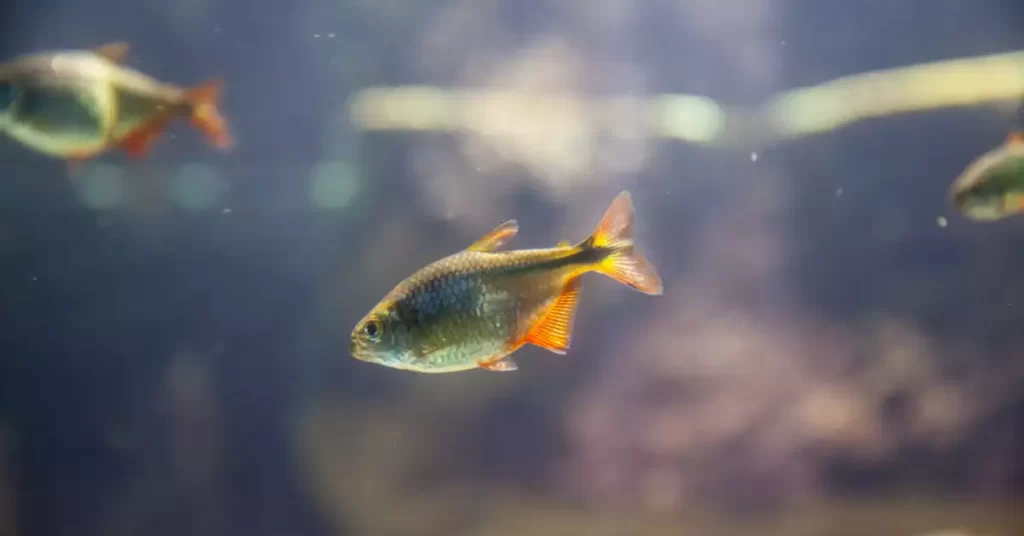As an aquarium enthusiast, you may be wondering if your Betta fish can safely consume Tetra Tropical Flakes, a popular fish food for many tropical species.
Understanding the dietary needs of your Betta fish is essential for their health and well-being.
In this comprehensive article, we will discuss whether Tetra Tropical Flakes are suitable for Betta fish and explore alternative dietary options for your aquatic pet. Let’s dive into the details!
The Nutritional Needs of Betta Fish
Protein Requirements
Betta fish, or Siamese fighting fish, are primarily carnivorous by nature. In the wild, they feed on insects, larvae, and small crustaceans.
Consequently, their diet requires a high protein content, typically around 40% to 50%, to maintain optimal health.
Fats and Carbohydrates
While fats are an essential source of energy for Bettas, they should not exceed 10% of their diet.
Carbohydrates, on the other hand, are less important for Betta fish, and excessive consumption can lead to health issues like bloating and swim bladder disorders.
Analyzing Tetra Tropical Flakes
Ingredient Composition
Tetra Tropical Flakes are formulated primarily for omnivorous and herbivorous tropical fish. The primary ingredients include fish meal, dried yeast, shrimp meal, algae meal, and various vegetable derivatives.
Though these ingredients provide necessary nutrients for many tropical fish, they may not be sufficient for the carnivorous Betta.
Protein Content
The protein content of Tetra Tropical Flakes is approximately 46%, which falls within the acceptable range for Betta fish.
However, it is essential to consider the sources of protein, as not all are suitable for Bettas.
Potential Risks of Feeding Tetra Tropical Flakes to Betta Fish
Inadequate Nutrition
While Tetra Tropical Flakes contain an acceptable amount of protein, the composition of the flakes is designed for a broader range of tropical fish species.
As a result, your Betta fish may not receive the appropriate nutrients required for their carnivorous diet.
Digestive Issues
Since Betta fish are not adapted to consuming high levels of plant-based ingredients, feeding them Tetra Tropical Flakes could lead to digestive issues such as constipation and bloating.

Alternative Foods for Betta Fish
Betta-Specific Pellets and Flakes
Several fish food brands offer Betta-specific pellets and flakes that are tailored to meet the nutritional needs of these carnivorous fish.
These specialized foods typically contain higher-quality proteins derived from insects, larvae, and fish meals.
Frozen and Live Foods
Supplementing your Betta’s diet with frozen or live foods like brine shrimp, daphnia, and bloodworms can provide essential nutrients and replicate their natural feeding habits.
Homemade Fish Food
Creating your own fish food allows you to control the ingredients and ensure your Betta receives the proper nutrition.
A blend of fish, shrimp, and insect-based ingredients can provide a balanced diet for your aquatic pet.
Best Practices for Feeding Betta Fish
Monitor Your Fish’s Eating Habits
Observe your Betta fish’s eating habits to ensure they are consuming the appropriate amount of food. If you notice any changes in appetite or behavior, it may indicate a problem with their diet or health.
Avoid Overfeeding
Overfeeding your Betta fish can cause obesity, swim bladder issues, and water pollution. It is crucial to provide the right amount of food and remove any uneaten food promptly.
Diversify Their Diet
While pellets and flakes should make up the majority of your Betta fish’s diet, it is essential to provide a variety of food sources to ensure they receive all the necessary nutrients. Supplementing their diet with live or frozen foods can improve their overall health and well-being.
Maintain Water Quality
Clean and well-maintained water is crucial for the health of your Betta fish. Regular water changes and monitoring water parameters can help prevent water pollution caused by uneaten food and waste.
FAQs
Can Betta fish survive on Tetra Tropical Flakes alone?
Although Betta fish may eat Tetra Tropical Flakes, they may not receive the appropriate nutrients necessary for their carnivorous diet.
It is best to provide Betta-specific foods or a combination of frozen, live, and homemade foods to meet their nutritional needs.
Can I feed my Betta fish Tetra Tropical Flakes occasionally?
Feeding your Betta fish Tetra Tropical Flakes as an occasional treat should not cause harm.
However, it is essential to ensure that the majority of their diet consists of Betta-specific foods or other appropriate options to meet their nutritional needs.
How often should I feed my Betta fish?
Adult Betta fish should be fed once or twice daily, providing only the amount they can consume within a few minutes.
Overfeeding can lead to health problems such as obesity and water pollution.
Conclusion
While Tetra Tropical Flakes can be consumed by Betta fish, they may not provide the ideal nutritional balance for their carnivorous diet.
To ensure the health and well-being of your Betta fish, it is best to feed them Betta-specific foods or a combination of frozen, live, and homemade foods.
Monitoring their eating habits, providing a diverse diet, and maintaining water quality will help keep your Betta fish happy and healthy in their aquatic environment.